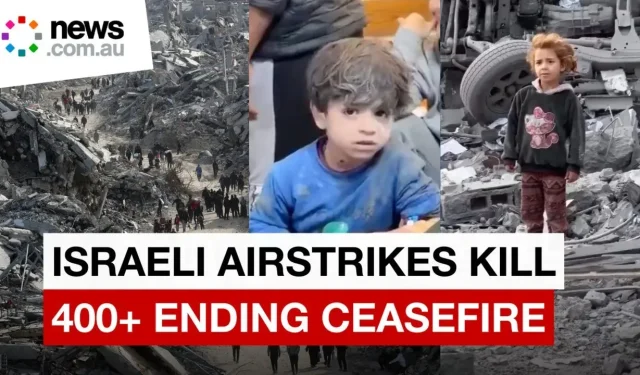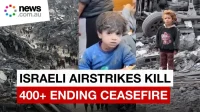Escalation of Violence: Over 400 Victims in Recent Airstrikes
In a significant surge of violence, Israeli airstrikes in Gaza have reportedly killed more than 400 individuals in just a matter of hours. This escalation marks a resumption of intense military action after a recent ceasefire agreement that had provided a temporary reprieve to the war-torn region.
Impact on Children: Alarming Statistics Arise
The ongoing conflict has had a devastating impact on the most vulnerable demographics, particularly children. Among the casualties of the latest strikes, dozens of children are confirmed dead. The situation is particularly dire, as reports indicate that since the onset of hostilities on October 7, 2023, over 17,800 children have lost their lives, with thousands more reported missing across Gaza.
Historical Context: The War’s Background
This current outbreak of violence follows escalating tensions in the region, with multiple ceasefire attempts failing to hold. The conflict’s roots can be traced back to long-standing tensions between Israel and Palestinian groups, which have repeatedly erupted into violent clashes. The humanitarian crisis continues to worsen as critical infrastructure in Gaza is severely damaged or destroyed, leading to widespread shortages of medical supplies, food, and clean water.
Humanitarian Concerns: Implications for Aid and International Response
The increasing civilian death toll raises urgent humanitarian concerns, prompting international organizations to call for an immediate ceasefire and increased humanitarian access to affected areas. Aid agencies are struggling to deliver essential services and support as airstrikes continue to disrupt relief efforts. There are fears that without significant international intervention, the situation will deteriorate further, leading to a potential regional crisis.
Potential Consequences: Geopolitical Ramifications
The continuation of hostilities may have far-reaching consequences not only for the Israeli-Palestinian conflict but also for broader regional stability. Countries in the Middle East are closely monitoring the situation, and any escalation could spark protests or unrest in neighboring nations. Additionally, ongoing violence complicates any potential mediation efforts by international bodies, undermining prospects for a long-term resolution.
Public Reaction: Calls for Action and Policy Changes
As reports of escalating violence and civilian casualties emerge, public outcry both locally and internationally is growing. Advocates for peace are urging governments around the world to take action, calling for sanctions against military actions that result in significant civilian harm. The response of political leaders will be critical in determining the future course of action and the potential for diplomatic resolutions.


